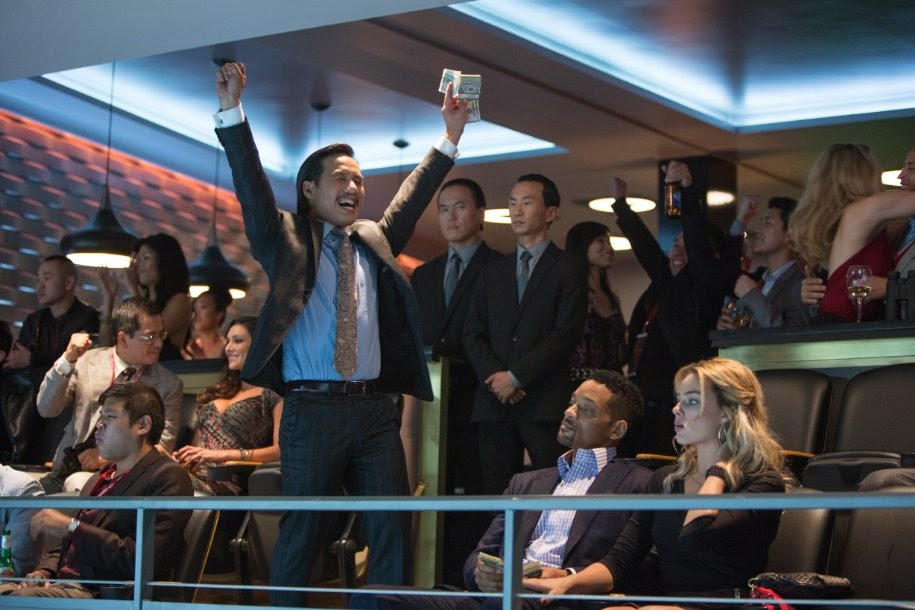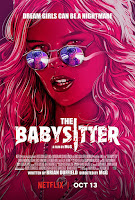The Hours
The Hours
(2002)
Directed by: Stephen Daldry
Written by: David Hare, based on
Michael Cunningham's book
Starring: Nicole Kidman, Meryl Streep,
Julianne Moore, Ed Harris
Rating: PG
Release Date: December 27th 2002
 |
| Meryl Streep & Ed Harris discuss their time together in The Hours Image Source |
There's a scene in director Stephen Daldry's The Hours that sums up the entire film. Dan Brown, an every-man in 1951 suburban America, is recalling his time in the pacific during the Second World War; seemingly he's telling a short anecdote about how the love between him and his wife, Laura, (Julianne Moore), blossomed. Laura, close to the emotional breaking point attempts to stop him from telling a useless and pointless story, especially since she's had an emotional day; she's attempted suicide, but hasn't told anyone about it. Yet, Dan may be telling her, his son, and the audience more than what's literally being said. During his time at war, surrounded by bloodshed and the darkest depths of inhumanity, it was the idea of Laura, her innocence, her love and the happiness he might have with her that kept him sane, "it was the thought of our happiness that kept me going," he says. That's the central theme of Stephen Daldry's The Hours. Not experiencing happiness, but expecting it; like the poignant lyrics of Steven Page's "War on Drugs"; "won't it be odd, to be happy like we always thought we're supposed to be, but never seem to be? Won't it be dull, when we rid ourselves of all these demons haunting us, to keep us company?"
The Hours is about many things, but at it's core rests a few dominant themes; mental illness, motherhood, suicide and gender equality. Through a narrative that spans decades, generations and lives, we meet our central characters; Virginia Woolf, (Nicole Kidman), in 1921, suffering from what might be schizophrenia, a bout of existential dread, and writing her novel, Mrs. Dolloway. Laura Brown, (Julianne Moore), in 1951, a stay-at-home-mom with repressed sexual desires, extreme self-loathing and a home life that's falling apart under the facade of white-picket-fence suburban America. Finally, we have Clarissa Vaughan, (Meryl Streep), a New York socialite who seemingly lives to please those around her in modern day, (2002), America. It's not until the final few frames that we see her failed relationship and never ending platonic love affair with AIDS-stricken and prize winning novelist Richard, (Ed Harris), has connections that run through the entire twentieth century stories of these three women.
To talk about the intricate plotting, the characterization, et. al., would be a waste of time; instead, the themes of The Hours are what's most important. Our own consciousness and mortality, I believe, is something we all struggle with. When that struggle is enhanced by mental illness or reinforced by society, life becomes that much harder. The entire film, Woolf struggles with her confusion over whether killing herself is truly taking control of her destiny or if it's just a cop-out and an escape from the world around her. In writing Mrs. Dolloway, (which I'll admit; I haven't read and I feel as if doing so would add even more depth to the film), Woolf explores these feelings and taboo subjects; illustrated by the 1951 and 2002 storylines that have become affected, like the proverbial butterfly flapping it's wings, by her literature through time. First just words on a page, ending up as a hurricane of human gore on the streets of modern America. What good is life if we don't follow our passions? If we can't follow the love we know is the true love that our hearts are searching for from the day we're born, what's the point? Especially in 1921 and 1951 when homosexual love was forbidden by law, why take part in a society that hates you? You can try and change society, but as a single, lonely person, that can quickly become a losing battle. Only by sharing our different stories of love, hate, passion, sex, loss, laughter and tragedy can we begin to see that the human condition really is universal. While gender and social constructs like race and sexual orientation may make us seem different, this isn't totally true; yes, we're all unique notes, but still 'variations on a theme.'
The greatest thing about Daldry's film is it's ability to illustrate the subtleties of the human condition and how different choices make for different outcomes; for better or worse. As a dying Richard, ready to loose his own mortal coil peers into Clarissa's eyes, he asks "I'm staying alive for you. But what happens when this 'party' is over, and I'm still here? What happens to those hours? How do I fill the Hours?" The film offers all types of different answers, but seems to fall on one partial conclusion; as long as you're searching for meaning, and finding fleeting glimpses of happiness of love, is it not worth living? Should we not be grateful that we, if only for a few short moments, are able to transcend the monotony and cruelty of life? Is it not meaningful if, only for a few moments we experience true altruism, in both giving and receiving love and kindness?
Overall, the most sane seeming and level-headed character of the film is Virginia Woolf, somewhat paradoxically. In reality she was plagued by mental illness and took her own life by filling up her pockets with stones and walking into a deep river, (Florence and The Machine's "What the Water Gave Me" is a beautiful tribute to the tragic artist). But is a person truly insane, if they are aware of their own mental instability? The Hours suggests, that in her most lucid moments, Woolf knew exactly what she was doing, especially when she chose to enact her own demise. It might not be the right call for everyone, but, at least in a poetic fashion, Woolf felt so trapped by society and unable to change it, that it was the right decision at the time*. As we discover later, her novels did change society, and tragically, she was never around to see it. But she made an impact, and maybe her tragic demise helped her message get out to more people, and save some of them from suicide. Like I mentioned above, the butterfly effect of our choices amplifies over time - it's just hard to know how, and more frighteningly, why. Like any good physicist will tell you, though, sometimes there isn't a why. Sometimes our personal universe is just what we make it.
The universal accessibility of The Hours is it's greatest asset; I could talk about the subject matter of The Hours for pages upon pages, and I feel as if a more inclined film critic could devote an entire book to the multitude of themes, messages, motifs and allusions within. I love films, but part of me enjoys the fact that there's so much to explore in Daldry's film, and that the film itself, like the literature in The Hours might impact my future outlook in ways I didn't perceive at the time. That's why it's such a brilliant cinematic achievement; it's accessible in so many different ways, and only by revisiting it, (much like love), can we truly find meaning at it's core.
In closing, the script, based upon Michael Cunningham's pulitzer prize winning novel of the same name, is The Hours strongest point, and the foundation on which everything else rests. However, without performances from acting juggernauts Streep, Moore, Harris and especially Kidman, (she more than deserved her Academy Award for her performance), makes the film believable. In the hands of lesser actors, under the hand of a lesser director, the characters could have easily slid into archetypes and performances with extended scenery chewing. Instead, poignant, eviscerating and meaningful performances send the film into the cinematic end-zone. Even the supporting cast, including Claire Danes, Allison Janey and Jeff Bridges add layers to the universality of The Hours. Much like Alec Baldwin in Glengarry Glen Ross, Bridges' character has barely any screen time, yet he swoops in, gives his monologue, delivers a single important line and leaves the film, and the audience, floored. It's a testament to the script, directorial vision and the talented ensemble cast that makes The Hours a cinematic masterwork, that should be cherished and revisited, much like Woolfe's Mrs. Dalloway, for years to come. Ultimately, the hours we all share should be cherished, and it takes work to find love, happiness and meaning in them. Stephen Daldry's The Hours is 114 minutes of pure perfection.
GRANT'S RATING: 5/5 STARS
Nicole Kidman & Stephen Dillane in The Hours clip "You cannot find peace by avoiding life"
*Although it works as a poetic device in The Hours, suicide is never the right choice, and there's always a way out. Things do get better. If you need help, click here, or google search "mental health help line" to find a local resource.



Comments